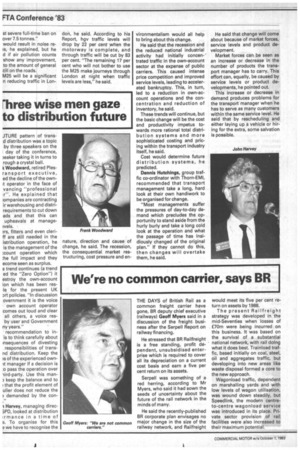rhree wise men gaze to distribution future
Page 60

If you've noticed an error in this article please click here to report it so we can fix it.
JTURE pattern of transd distribution was a topic by three speakers on the day of the conference, )eaker taking it in turns to rough a crystal ball.
k Woodward, retired Plesransport executive, ed the decline of the ownit operator in the face of vancing "professional r". He explained that :ompanies are contracting ir warehousing and distrirequirements to cut down ads and that this can upheavals at managewels.
)rs, fitters and even cleriff are still needed in the istribution operation, he is the management of the 1count operation which :he full impact and they ecome seen as surplus.
s trend continues (a trend ed the "Zero Option") it estroy the own-account ion which has been resle for the present UK Drt policies. "In discussion overnment it is the voice own account operator comes out loud and clear all others, a voice resby user and Government ny years."
recommendation to inis to think carefully about .nsequences of divesting responsibilities of transnd distribution. Keep the of the experienced own)t manager if a decision is .o pass the operation over iird-party. Use this man) keep the balance and to that the profit element of ulier does not reduce the ) demanded by the con
1 Harvey, managing direcSPD, looked at distribution ,rmance in a time of a. To organise for this 9 we have to recognise the
vironmentalism would all help to bring about this change.
He said that the recession and the reduced national industrial activity had initially concentrated traffic in the own-account sector at the expense of public carriers. This caused intense price competition and improved service levels, leading to accelerated bankruptcy. This, in turn, led to a reduction in own-account operations and the concentration and reduction of inventory, he said.
These trends will continue, but the basic change will be the cost and productivity impetus towards more rational total distrib u tion systems and more sophisticated costing and pricing within the transport industry itself, he said.
Cost would determine future distribution systems, he predicted.
Dennis Hutchings, group traffic co-ordinator with Thorn-EMI, recommended that transport management take a long, hard look at their own handiwork to be organised for change.
"Most managements suffer the pressures of day-to-day demand which precludes the opportunity to stand aside from the huriy burly and take a long cold look at the operation and what the passage of time has insidiously changed of the original plan." If they cannot do this, then changes will overtake them, he said. He said that change will come about because of market forces, service levels and product development.
Market forces can be seen as an increase or decrease in the number of products the transport manager has to carry. This effort can, equally, be caused by service levels or product developments, he pointed out.
This increase or decrease in demand produces problems for the transport manager when he has to serve as many customers within the same service level. He said that by rescheduling and either laying up a vehicle or hiring for the extra, some salvation is possible.




































































































